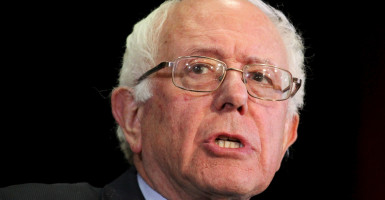Sen. Bernie Sanders, I-Vt., introduced a bill Wednesday to lift federal prohibitions on marijuana and throw the decision on legalizing the drug squarely into the hands of the states.
Sanders’ plan would strike marijuana from the Drug Enforcement Administration’s list of the “most dangerous” substances, which currently classifies weed alongside drugs such as heroin, ecstasy, and LSD.
The legislation also would remove marijuana from the Controlled Substances Act, the U.S. government’s central drug control law, giving states the authority to legalize and regulate marijuana without federal interference–in the same way states govern alcohol and tobacco sales.
“Too many Americans have seen their lives destroyed because they have criminal records as a result of marijuana use,” Sanders, who calls himself a democratic socialist, said at George Mason University last week. “That’s wrong. That has got to change.”
Sanders underscored the fact that 2.2 million people are imprisoned for various offenses across the nation, which he said costs taxpayers roughly $80 billion a year. Changes to drug laws could help alleviate the situation, he said.
“The time is long overdue for us to take marijuana off the federal government’s list of outlawed drugs,” he said.
Marijuana advocacy groups hailed the bill, the first in the Senate aiming to end the federal prohibition, as a positive step.
“The science is clear that marijuana is less harmful than alcohol, and that should be reflected in our nation’s marijuana policy,” Mason Tvert, director of communications at the Marijuana Policy Project, told Huffington Post. “Senator Sanders is simply proposing that we treat marijuana similarly to how we treat alcohol at the federal level, leaving most of the details to the states. It is a commonsense proposal that is long overdue in the Senate.”
But Cully Stimson, manager of The Heritage Foundation’s national security law program, disputed that the drug is as safe as advocates claim.
“Sound science should drive the issue of whether marijuana should be delisted as a Schedule I controlled substance, and sound science is clear: Marijuana is a dangerous, addictive drug,” Stimson told The Daily Signal.
Stimson said the American Medical Association and the American Lung Association, along with countless medical and mental health experts, oppose removing the drug from the DEA’s “most dangerous” Schedule I category because a series of studies concluded marijuana is harmful and addictive.
Chuck Rosenberg, acting administrator of the DEA, said Wednesday that smoking marijuana for medicinal purposes is “a joke.”
“What really bothers me is the notion that marijuana is also medicinal—because it’s not,” Rosenberg told reporters. “We can have an intellectually honest debate about whether we should legalize something that is bad and dangerous, but don’t call it medicine—that is a joke.”
Although pot remains illegal on the federal level, 23 states and Washington, D.C., have legalized some forms of marijuana use. Another 17 states are moving to advance ballot initiatives on legalization in 2016.





























